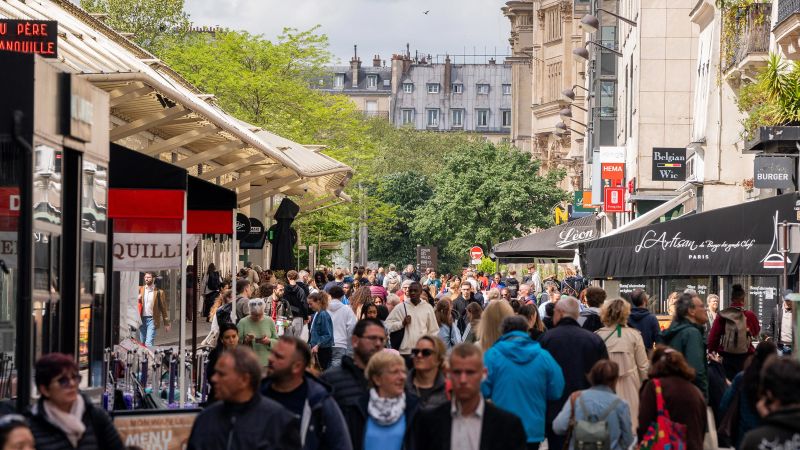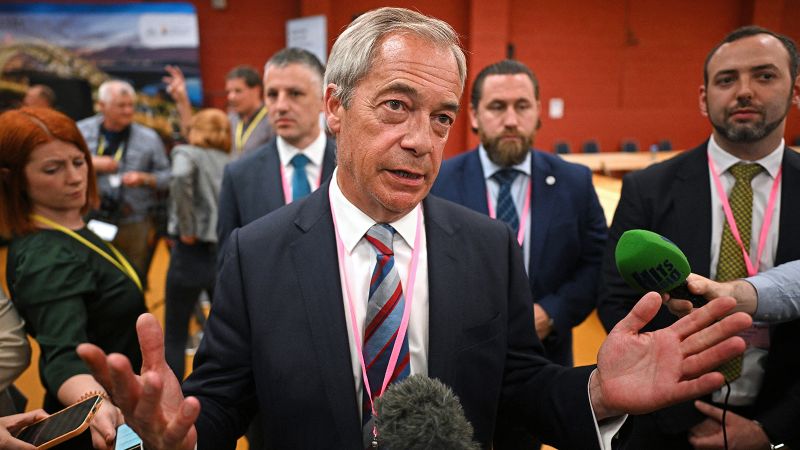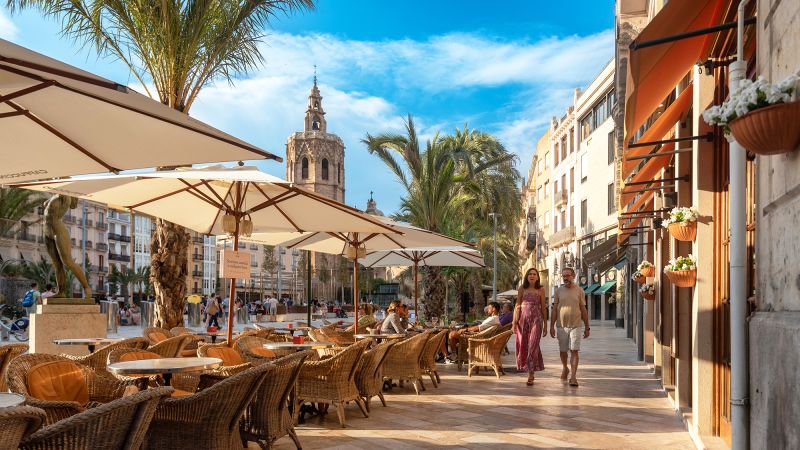London
CNN
—
President Donald Trump might want a new, “America First” world, but in the race to control inflation the United States may actually come last. That’s because, while his tariff hikes are widely expected to jack up prices at home, they could lower inflation across the pond.
The reasons are multiple, ranging from a possible influx of low-priced Chinese exports into Europe to the recent rise in the value of the euro. Aside from the benefit to consumers’ pockets, lower inflation will give European policymakers room to cut interest rates if the economy needs a helping hand — whereas the US could find it hard to lower borrowing costs if the world’s biggest economy needs a boost.
That’s just one way Trump could “Make Europe Great Again,” as economists at Nomura, a global financial services group, put it in a recent research note.
Influential forecasters at the International Monetary Fund also see Trump’s tariffs pushing inflation higher in the US, they wrote in their latest outlook report.
The main reason higher US tariffs will likely raise prices in America is because tariffs are taxes on imports, whether of finished goods or parts.
There are already signs some companies will pass on the costs of the tariffs to American consumers, rather than absorb them. For example, the Adidas CEO said earlier this week that cost increases due to higher tariffs “will eventually cause price increases” in the US. Outside of the US, “there is no reason” to raise prices because of the levies, Bjørn Gulden later added.
The impact of US tariffs introduced in 2018, during Trump’s first term, suggests an inflation bump is on the way. A 2019 study, co-authored by Mary Amiti at the Federal Reserve Bank of New York, found a “complete pass-through” of those tariffs into the domestic prices of imported goods.

Even non-tariffed companies might raise their prices. “Domestic producers raise their prices when their foreign competitors are forced to raise prices due to higher tariffs,” Amiti and her co-authors wrote.
While Trump has already implemented an additional 10% tariff on goods imports from almost all countries, as well as much higher tariffs on some sectors and a gigantic duty on imports from China, the European Union has so far only threatened limited retaliatory tariffs on US goods.
The EU may yet put in place a stronger response, which could raise the prices of imports from the US, but the impact on European inflation would still be a lot smaller than what’s in the cards for the US. That’s because, in contrast with Trump’s maximalist approach, Europe would be “only putting tariffs on a single country’s imports,” George Buckley, chief European economist at Nomura, told CNN.
As things stand, economists say, Trump’s tariffs are more likely to slow inflation in the EU this year and next, in four ways.
One is what Christine Lagarde, European Central Bank president, has described as likely efforts by China to “reroute” its exports away from the US, possibly to Europe. “That would have a dampening impact on prices,” she said in an interview on the Washington Post Live platform last week. More goods on the market mean more competition, which means lower prices for shoppers.
Jack Allen-Reynolds, a senior economist at consultancy Capital Economics, explained in a note in April: “Increased competition from cheap Chinese imports could push goods prices down… And with China currently facing much higher tariffs than we had expected, its exporters might slash prices further to offload goods that would otherwise have been sent to the US.”
China is already shipping a lot less to the US, with industry data showing a plunge in sailings last month.
Trump’s whipsaw policy changes have also driven investors away from US assets — including the dollar. In contrast, the euro has strengthened since April 2, when Trump unveiled the 10% tariffs on nearly all countries and even higher levies on products from about 60 nations and trading blocs, including the EU.
The euro has gained 3% against the currencies of the eurozone’s main trading partners, including the dollar, and stands not far off the record high hit on April 22. A stronger currency makes imports cheaper, which generally results in more goods, higher competition and thus lower prices on the market.
Against just the dollar, the euro has risen by a larger 4% since April 2.
“I think concerns about the US economy have dominated (the dollar’s slide),” said Ruben Segura-Cayuela, head of economic research for Europe at the Bank of America. “And second, I think a lot of the recent developments have created some risk premium for US financial assets.”
Meanwhile, expectations of a hit to the global economy from Trump’s tariffs have helped drive energy prices lower since April 2, as traders predict less demand for fuels.
Oil prices tanked in the wake of his “Liberation Day” tariff announcements. Brent crude, the global benchmark, has lost 17% since then.
Natural gas prices have also declined and more sharply in Europe than the US. That could get worse, based on World Bank forecasts published this week. It sees US natural gas prices surging overall in 2025, with another small rise in 2026, while European prices are predicted to increase only modestly this year and fall next year.
The expectations of weaker economic growth have another, broader effect too. Coupled with extreme uncertainty about the direction of trade policies, they are discouraging spending by businesses and denting consumer confidence in Europe. That is the fourth curb on prices, with economists predicting that consumers will also eventually spend less.
While the trade war could slow price increases in Europe, there are still some factors that could nudge inflation higher in the region. One is the recent parliamentary approval in Germany, Europe’s largest economy, of a plan to massively increase investment in infrastructure and defense. Another is an agreement by European leaders in March to ramp up defense spending.
But all that spending will take a while to happen, possibly years.
And with the current level of global uncertainty, who knows what could happen by then.

























